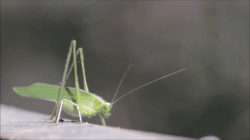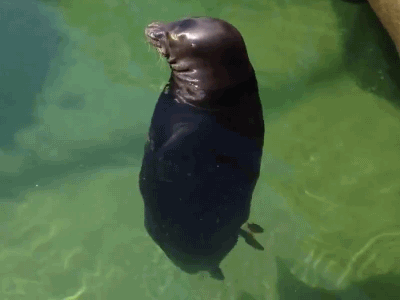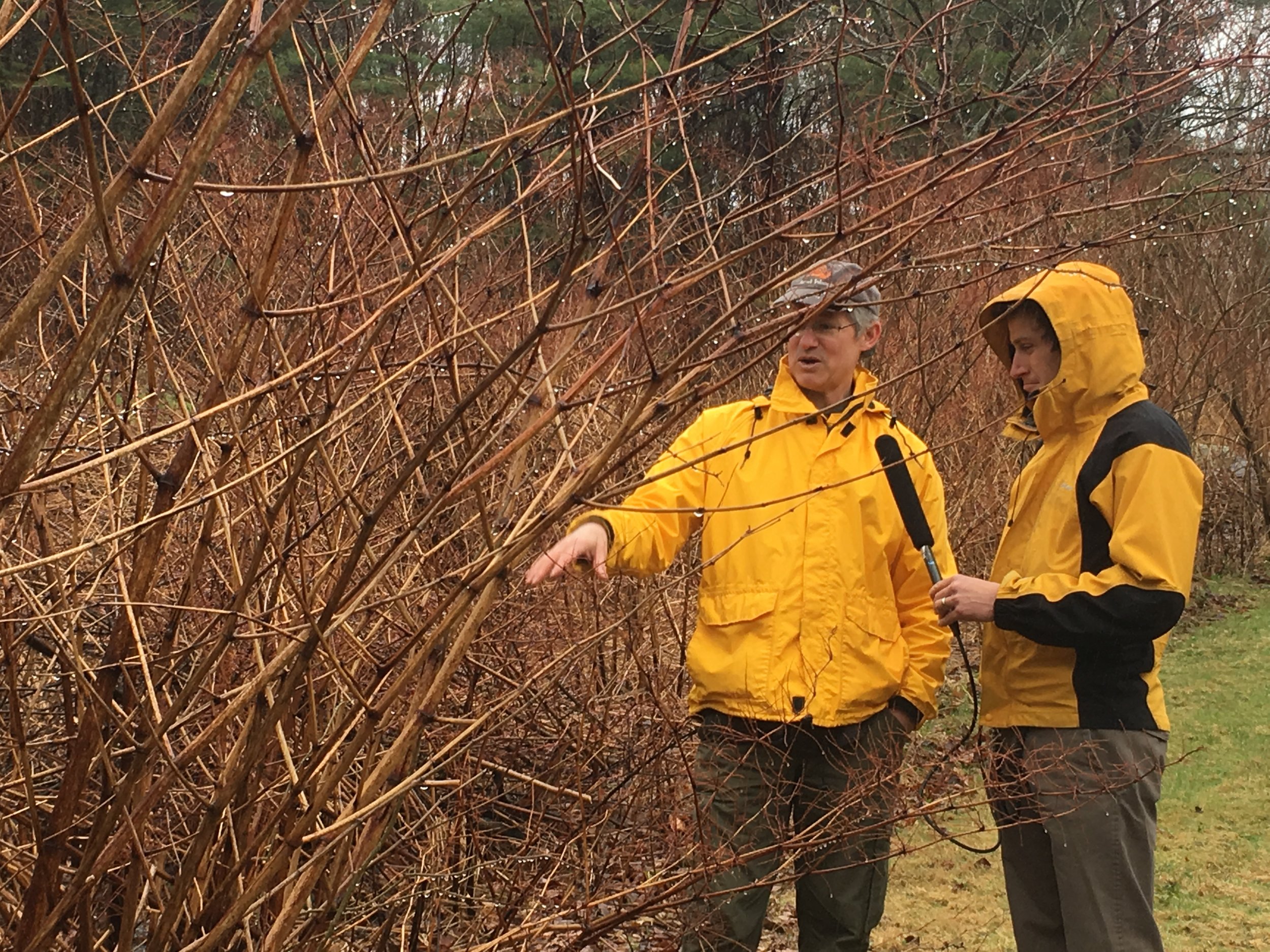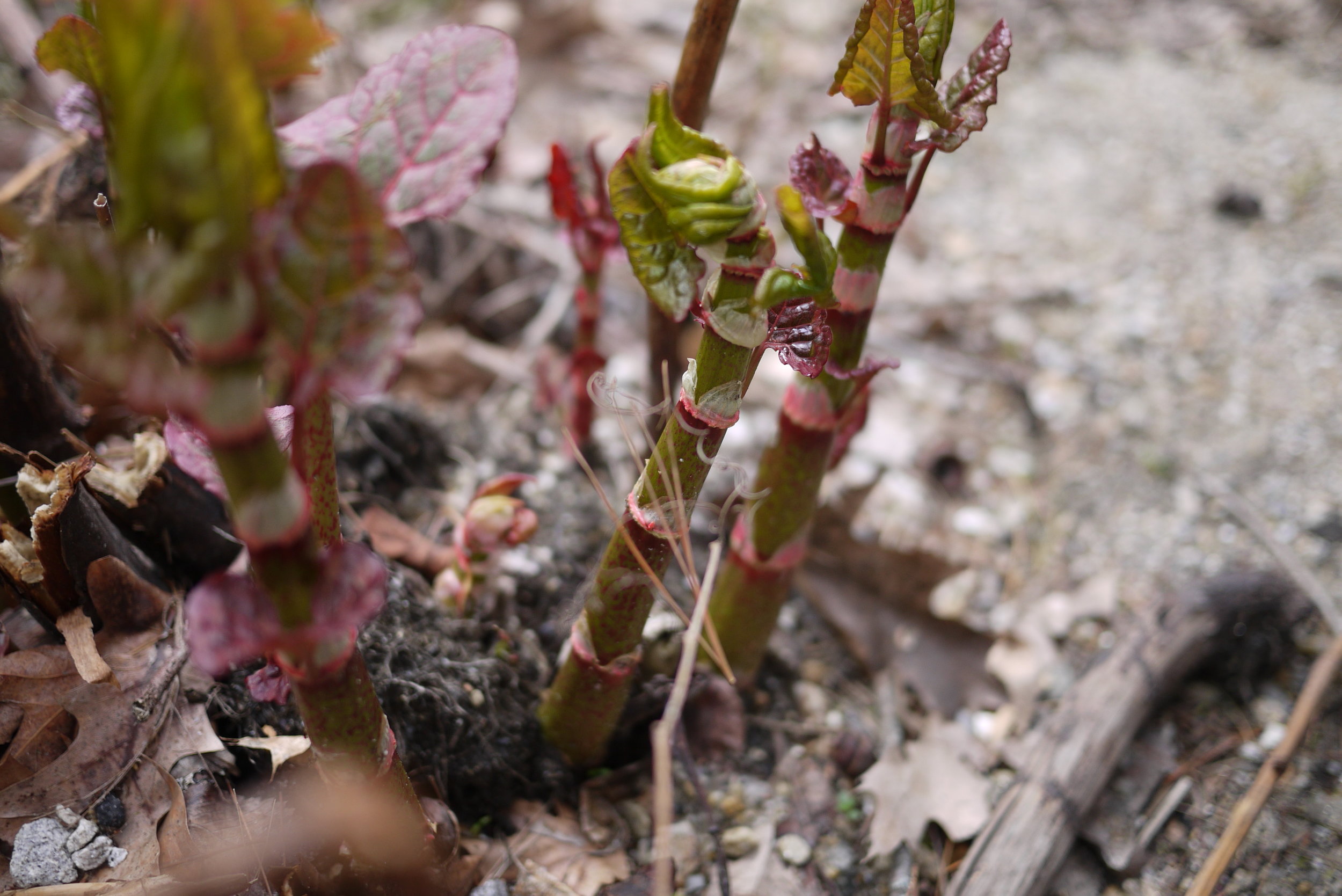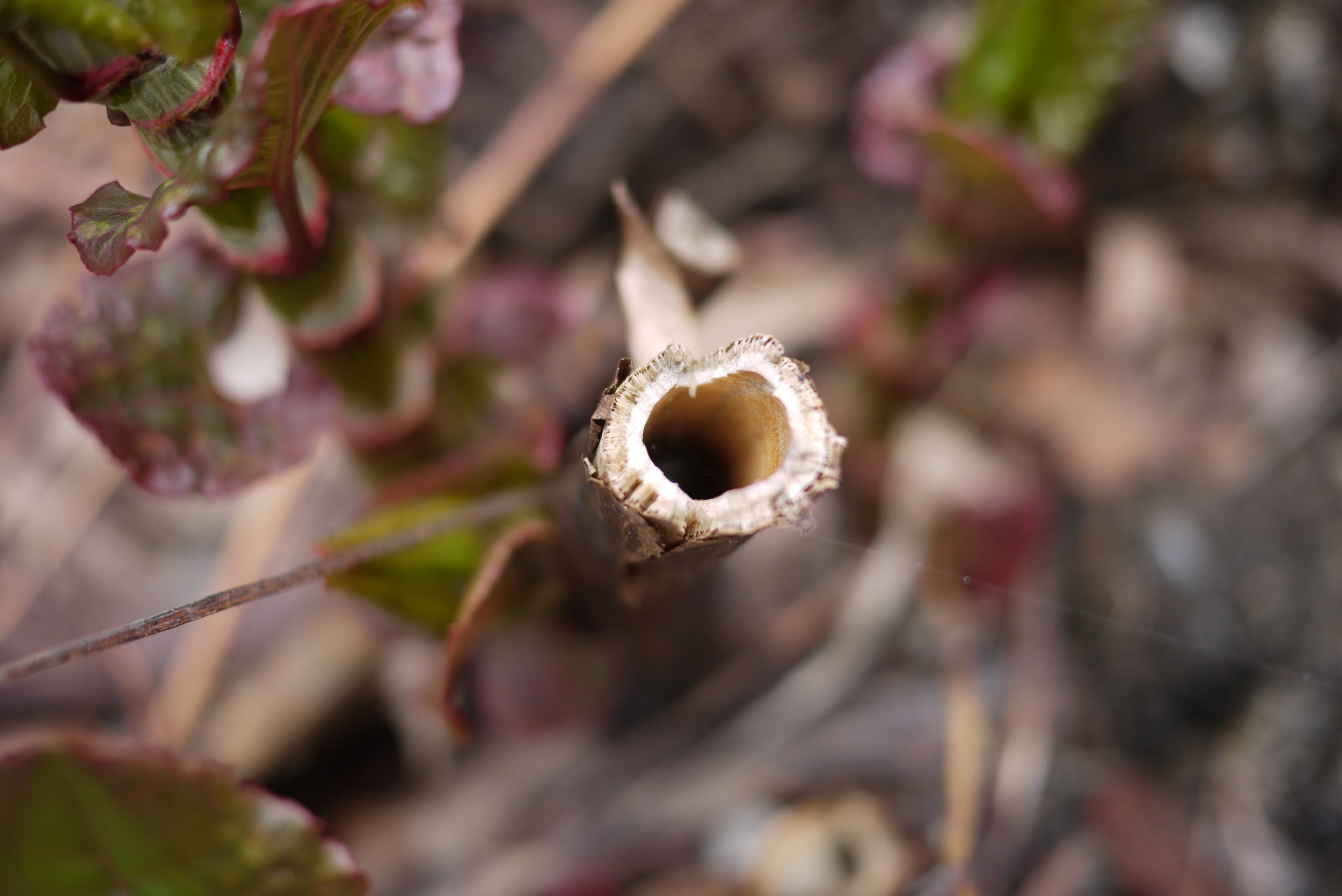Ask Sam | Eating Grass, Killing Trees, Bottling and Logging
The Ask Sam hotline has been blowing up lately! Not like the Galaxy 7, no. In a good way! So Sam, along with a couple of producers from the Outside/In team, took a moment to answer your questions about tree killing, grass eating and the sound in the woods that scared the colonists away. And that's just to name a few. Somebody even gets a trail name out of this one.
Question 1: Trevor in Bailey, CO asks:
"Is the tradition we have of bringing flowers to funerals and cemeteries propagating invasive species?"
Trevor, what's your story? You a man of the cloth? A gravedigger? A mourner? Whatever the deal, calling us from a cemetery with your question about cemeteries really set the scene. We applaud your commitment to the hotline... and to the ceaseless pursuit of knowledge about the outside world.
So, Sam played in-studio expert here and you can rest in peace, Trevor! Those funeral flowers probably aren't doing anything to mess with the delicate balance of the graveyard, or lands graveyard-adjacent. First of all, those flowers are likely picked, cut, and artfully arranged before an insect can get around to pollinating. No pollination, no seed. Not to mention the fact that most florist blooms are annuals. They've got one shot to impress, and then they're gone for good. They're also delicate. That leaves them with pretty rotten chances in the invasion business. Sam says funeral flowers don't stand much of a chance against robust greenery.
That said, if you're in Maine laying a bouquet at the grave of your late cat in a mysterious place that your neighbor Jud took you to, well. All bets are off. Sam didn't speak to the fate of flowers in the pet cemetary.
Question 2: Gregory in MA asks:
"I am sitting across from my neighbor's tree and it is just pissing me off. It is really big and obnoxious, and I was wondering what the punishment is if I just poisoned it and made it come down on its own."
Look, Gregory, we're not lawyers over here or anything. But producing a podcast is kind of like going to law school, right? Right?Either way, producer Hannah McCarthy took your case. Congratulations!
This crime is on the books in your state, Gregory. It's actually on the books pretty much everywhere because people killing other people's trees is a popular past time. What is it about these tall drinks of pulp that makes people snap like a dead branch? Whatever the reason, Massachusetts Neighbor and Tree law says you could go away for up to six months for injuring someone else's tree. It's more likely, though, that you'll just be fined for three times the assessed value of the 'ol leafy giant. And a mature tree goes for anywhere between $1,000 and $10,000. So, unless you're looking to shell out thirty grand to your tree-hugging neighbor, this not-lawyer is going to recommend against the surreptitious offing of the offending arbor.
Now, if you were going to poison a tree, and do so without getting caught, the internet is flush with helpful information. Especially the forums of cycling websites. Don't ask me why, Gregory, but I do want to point out that our own Sam Evans-Brown is an avid cyclist. Coincidence?
Yeah. Probably. Sam loves trees.
Question 3: Eric in Philadelphia, PA asks:
"On the "Tell Me Something I Didn't Know," podcast, I learned the weight we lose when we lose weight is exhaled via carbon dioxide when we breathe, and I was just curious, or had the assumption that if everyone on Earth lost the weight that we need to lose to be at, I guess, a regular BMI, would that have any measurable impact on CO2 levels in the atmosphere, and could that have any impact on global warming."
It may sound like a load of hot air, but it's true! If you trace the atoms in fat being lost, most of them are exhaled as carbon dioxide. The rest becomes water. Just think... every time you throw Terms of Endearment on for a good cry, that could be former fat falling down your cheeks. Weird.
As for whether a weight loss craze could put a dent in the atmosphere, well, Sam says a couple billion jazzercisers can't really compare to the Industrial Revolution. But we're a facts-based operation over here, so Sam Good-Will-Hunted this one for you, Eric.
Here's the rundown. There are approximately 2.1 billion overweight people on Earth, all an average of 20 pounds overweight. Those 20 pounds are about 18-percent carbon. So, if everyone who is overweight lost twenty pounds, it would release about 3.3 million tons of carbon into the atmosphere. That's the equivalent of the amount of carbon produced by 698,339 cars. So, a little more than all of the cars in Florida. Now, I know what you're thinking. Dang! That's a lot of carbon! Better discourage that whole "jogging" thing. But here's the deal. That's only 0.08-percent of global carbon emissions.
So, in short, no. Even if everyone worked their tucheses off to get in shape, it wouldn't make a measurable difference as far as global warming goes.
It's not your fault, Fat. It's not your fault.
Question 4: Rhine* in Purvis, MS asks:
"I've been told my entire life that when dogs and cats eat grass, it's because they have intestinal worms, but my dog has had fecal tests and takes a de-wormer pill every month. So, I know he doesn't have any intestinal worms, but he still eats grass occasionally. So, I'm just wondering if there's any truth to that claim that animals will eat grass if they have worms. And if so, why? And do all animals do that?"
Look, who among us hasn't gone for a walk and munched on some Bermuda, or sampled the neighbor's finest Fescue? But are we doing it to keep the worms at bay? Well, to get to the root of this belly scratcher, producer Jimmy Gutierrez placed a call to someone who knows a thing or two about weird pet habits.
See, Jimmy's cat, Juanito, has something in common with your canine companion, Ryan.* He's got his go-to activities in the great outdoors. Watch birds, walk under cars, eat grass. And every time Juanito indulges? Well, it kind of seems like that grass isn't agreeing with him. Because it comes right back up. Jimmy's theory? Juanito's stayin' regular. But he called his favorite animal doc to confirm.
We hate to disappoint, Brian*, but New Hampshire-based veterinarian Allison Frontz says this one remains a mystery, "There truly is not an answer to the question. Dogs and cats will eat grass really for no apparent reason. " Dr. Frontz says that it's commonly thought that animals eat grass in order to throw up, but that's really only based on the fact that so many do when they eat it. There's no evidence to show that Juanito actually needs to throw up in that moment, through. Animal scientists have studied this behavior and concluded that, well, some cats and dogs just like to eat grass.
Dr. Frontz does recommend that you stop your pet from regularly eating grass if it makes them throw up, because nobody needs to be getting sick every day.
*Okay, we admit it. We couldn't make out your name on the tape, Rhine-Ryan-Brian. We haven't been able to enjoy a single bite of grass since.
Question 5: Shredder* in VA on the Appalachian Trail asks:
"We are all New Englanders but we've come down here in the South and we've made it to Virginia and we keep hearing this strange noise everywhere and we don't know if it's an insect or a bird or a frog, and I feel like I've failed my friends as the one with the forestry degree, so I'm just gonna hold my phone out and let the sound be heard and see if any of you guys know what it is."
I mean, we don't want to suggest you've wasted your time and money and energy on that forestry degree or anything, but Sam knew what this was right away, so...
Just kidding, Shredder! You've just hiked thousands of miles through the thing that you've got a degree in, so you put us all to shame.
Anyway, there are katydids in them there hills! Of the Tettigoniidae family, for those of us with a forestry degree. Our friends across the pond call 'em bush crickets, and some old-schoolers refer to these wee beasties as long-horned grasshoppers. Whatever you call them, these guys are loud. The sound that you're hearing out there on the trail, Shredder, is a bug song made when these guys rub their forewings together. The upper wing, called the file, has a serrated edge. The lower wing scrapes against the file to produce a heck of a tune. Put thousands of these musicians in one place and you get a pretty overwhelming sound. So overwhelming, Sam explains, that when European colonists first encountered the katydid song they were scared silly of the shrieking in the woods.
There are 258 identified species of katydid, and each species has it's own distinct sound. That's because these songs really only have one purpose: to attract a mate. The different songs, otherwise known as trills, are designed to attract females of the same species. So whenever you're lying under the stars, cursing this deafening late-summer sound, just remember... it's a love song. Or, a couple hundred love songs, all played at the same time. So romantic.
Katydids are most commonly found in the Southern part of the United States, so that's why you might be unfamiliar with them. And these insects would be pretty hard to spot -- they're designed to blend into their surroundings, mimicking leaves while they rest during the day. So, Shredder, you've far from failed your friends. Besides, you were the one clever enough to call the Ask Sam hotline!
*Shredder is a trail name (the name fellow hikers give you on the Appalachian Trail). We asked Shredder to give Jimmy a trail name, but she demurred. So, Sam let Jimmy have GZA, even though Mr. Gary Grice of Wu-Tang kind of already has it.
Question 6: Claire in St. George, ME asks:
"I'm wondering whether harbor seals and other aquatic life know if it's raining or not."
We didn't spend much time guessing on this one, Claire. Between the nature of sounds in the ocean and harbor seals' notoriously reticent ways, Sam decided to go straight to an expert.
Enter Jim Harvey of Moss Landing Marine Laboratories in Moss Landing, CA. We caught Jim at a good time, because he'd recently heard some data from the Monterey Bay aquarium. turns out they've got a hydrophone in the bay that's listening to sounds in the ocean. And that hydrophone has picked up the sound of rain on the ocean's surface at almost a thousand feet below. So, Jim says, "the answer is that if the harbor seals have [hearing as good] as the hydrophone, then, yes, certainly seals should be able to hear rain if they were underwater, if they can hear that frequency."
Harbor seals have hearing similar to that of a cat or dog when they're on land, and that hearing improves once they're under water. So, Claire, it's certainly possible that these sea dogs (as well as other aquatic life) can hear a rainstorm even when they're underwater.
But what about on land? Jim says he's spent plenty of time observing harbor seals, and that they tend to tolerate a light rain. But when things get heavy, you'll see them escape the storm by slipping underwater.
Oh, and one more thing! It isn't relevant to rain, but it is adorable. Seals do this thing called bottling, resting with their head above water and their bodies submerged. And Jim says they'll dip below the water, rest on the ocean floor for a moment, and then bob back up. For hours. And when they just float on their sides? That's called logging. A mysterious and noble creature.
Outside/In was produced this week by:
Sam Evans-Brown, with help from, Maureen McMurray, Taylor Quimby, Jimmy Gutierrez and Hannah McCarthy.
If you’ve got a question for our Ask Sam hotline, give us a call! We’re always looking for rabbit holes to dive down into. Leave us a voicemail at: 1-844-GO-OTTER (844-466-8837). Don’t forget to leave a number so we can call you back.
Our theme music is by Breakmaster Cylinder.
This week’s episode includes tracks from Podington Bear and Ari De Niro Check out the Free Music Archive for more tracks from these artists.
Outside/In is a production of New Hampshire Public Radio.







